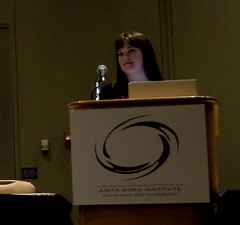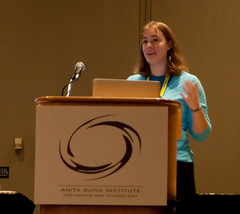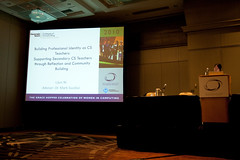As always, I've got to say that it's a real breath of fresh air to hear people talk about their research at GHC. Often times, I dread grad student presentations (despite being a grad student myself!) because the quality of presentation isn't polished... but this is totally not the case at GHC. These women are enthusiastic, interesting, and great communicators and it's been a joy to attend these sessions. So here's the three women whose talks I caught today. (My apologies for the poor quality of the pictures: the room was quite dark and I was too busy listening to focus on photography!)

Usable Security in Practice: Collaborative Management of Electronic & Physical Personal Information
Presenter: Laurian C. Vega (Virginia Polytecnial Institute)
Security literature likes to imply that humans are the weak link in the security chain, but that's not actually true: much of the problem is that security work doesn't take the human into account when designing systems, so we wind up having to do things just that don't make sense. I sort of take this as a given, since it's a common theme within my own security group and our larger research network, but it's sometimes a hard sell in the larger security community.
So I was really thrilled to see Laurian's presentation about how she's investigated taking the human into account in security research for electronic health records. She points out that we need to go beyond focusing on getting medical folk to adopt them, figuring out their workflow, etc. and understand the entire environment in which a system is used, particularly when considering records in medicine.
Laurian's been doing active observation at childcare centres and physician's offices, specifically in rural southwest-virginia. Because she was working with rural sites, she's found a lot of the records are non-electronic, which in some ways can make things more secure: physical records can be hidden behind someone's desk, files can be hidden in the back, cabinets can be closed. One problem she found in childcare and physician's offices is there are quite a lot of interruptions, and many people do not return to the task when they're interrupted. Laurian's looking at ways to design systems which can handle this sort of interruption, as well as other realities of what goes on in the offices. This is pretty neat and not much like traditional security work, which assumes a user who's paying attention and will always do all the right steps. It sounds like some really fascinating work to deal with some very specific challenges!

In the Beginning: The Early Lives of Users in Online Communities
Presenter: Katherine Panciera (University of Minnesota)
From the title, I was expecting a more broad look at various online communities, but Katherine's work actually focusses on wiki contributions, specifically a site called Cyclopath where users can contribute cycling route information, including the roads to follow and details about what to expect along the way. The idea was to see how the top 5% of users ("cyclopaths") differed from other users, and how cylopath users in general differed from users of Wikipedia.
It turns out that you can actually determine which users will become cylopaths from day one: they start off by making many more edits than more casual users (50ish versus 5ish), and like Wikipedia users it turns out that people start high and then slowly tail off to a stable editing pattern. But what was even more interesting about Katherine's research is that you could see patterns in the future cyclopath uers use of the site even before they started editing.
I can only imagine how helpful it might be to be able to identify your top users and perhaps encourage them right from the beginning so they feel even more at home in the community. Very neat!

Building Professional Identity as Computer Science Teachers: Supporting Secondary Computer Science Teachers through Reflection and Community Building
Presenter: Lijun Ni (Georgia Institute of Technology)
Lijun says she got interested in computer science teachers because there are very few of them at the K-12 level, so there's a great need to prepare and support the teacher. She's focused on two problems: it's very difficult to retain teachers (46% will leave teaching within 5 years, and math and science are worse than some other subjects) and teachers have some resistance to change (many in-service teachers will not adopt curriculum innovations). It's also surprisingly difficult for CS teachers to develop a sense of identity as a CS teacher, since there's inconsistent certification, it's hard to fit them into the school hierarchy, they have few peers, etc.
What I really thought was interesting about Lijun's work is that she's working on finding ways to support teachers over the course of their carrers, giving them opportunities to learn and grow and develop an identity as a CS teacher. She's looked at how their identities change over time to see how to better support them. This is really interesting because most effort thus far has been in training them to start rather than retaining people with very little focus on retention.
It got me thinking that this is something you also see as a problem when talking about women in computer science: there's lots of programs for younger girls who want to get involved, but fewer programs in place to help keep women from leaving in disgust. I wonder if Lijun would be interested in tackling that problem next?




0 comments:
Post a Comment